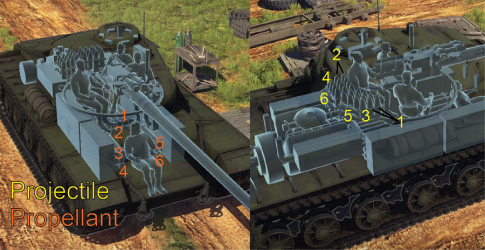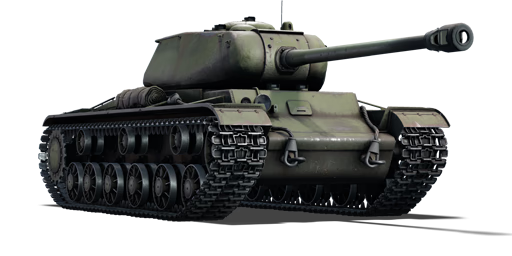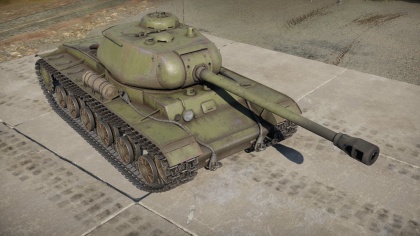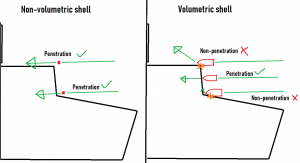Difference between revisions of "KV-122"
(→Usage in battles) (Tag: Visual edit) |
(→Usage in battles) |
||
| Line 147: | Line 147: | ||
However, most tanks at the battle rating and above can deal with the KV-122 easily due to the relatively low sloping of the frontal armour. Tanks below the 6.0 battle rating may be more lenient, all though it is unlikely. but tanks with high-velocity anti-tank weapons such as the [[M1 (76 mm)|76 mm gun]] in the U.S., [[Ordnance QF 17-pounder (76 mm)|17-pounder]] in the British, and the [[KwK 40 (75 mm)|75 mm KwK 40]] in the Germans should be taken with caution. | However, most tanks at the battle rating and above can deal with the KV-122 easily due to the relatively low sloping of the frontal armour. Tanks below the 6.0 battle rating may be more lenient, all though it is unlikely. but tanks with high-velocity anti-tank weapons such as the [[M1 (76 mm)|76 mm gun]] in the U.S., [[Ordnance QF 17-pounder (76 mm)|17-pounder]] in the British, and the [[KwK 40 (75 mm)|75 mm KwK 40]] in the Germans should be taken with caution. | ||
[[File:Wsp volumetric shell diagram.png|thumb|Differences between non-volumetric shells and volumetric shells hitting a Tiger I]] | [[File:Wsp volumetric shell diagram.png|thumb|Differences between non-volumetric shells and volumetric shells hitting a Tiger I]] | ||
| − | An important note when engaging tanks, especially Tiger I's, is that, with the implementation of volumetric shells, you can no longer expect your shells to pierce through small openings or right past an obstacle. The large | + | An important note when engaging tanks, especially Tiger I's, is that, with the implementation of volumetric shells, you can no longer expect your shells to pierce through small openings or right past an obstacle. The large 122 mm calibre of your shells will result in it catching on an armour plate's edge very often, losing all of its penetration. For example, a Tiger I has some edges that can absorb your shell unexpectedly, despite having flat armour. Thus you must always make sure that where you are aiming at is absolutely free of obstruction, or it may result in a non-penetration or a ricochet. This can be seen in the diagram to the right. |
=== Modules === | === Modules === | ||
Revision as of 09:49, 9 November 2020
Contents
Description
The KV-122 is a premium rank IV Soviet heavy tank
with a battle rating of 5.7 (AB) and 5.3 (RB/SB). It was introduced in Update 1.63 "Desert Hunters".
The KV-122 is a combination of the hull of the KV-1S and the turret of the IS-2.
General info
Survivability and armour
The armour of the tank at its BR is poor as compared to its lower tier brother the IS-1 which is packing 120 mm of frontal armor. The KV-122 is packing 75, the same as the KV-1. Unlike the IS-1 and IS-2, the KV-122 does not feature the prominent nose that prevents angling allowing a skilled user to angle their armor far above the base value of 75, combined with its 60 mm of side armor and its ability to tank shots while angled is high.
Armour type:
- Rolled homogeneous armour (Hull, Turret roof, Gun mantlet)
- Cast homogeneous armour (Turret, Cupola)
| Armour | Front | Sides | Rear | Roof |
|---|---|---|---|---|
| Hull | 75 mm (30°) Front plate 75 mm (70°) Front glacis 25 mm (25-70°) Joint plate 75 mm (26-75°) Lower glacis |
60 mm 40 mm Turret ring guard |
40 mm (26-79°) Top 75 mm (6-73°) Bottom |
40 mm 30 mm Ports and engine grille |
| Turret | 100 mm (0-72°) Turret front 100 mm (2-58°) Gun mantlet |
100 mm (9-20°) | 100 mm (13-32°) | 30 mm 35 mm Hatches |
| Armour | Sides | Roof | ||
| Cupola | 82 mm | 35 mm |
Notes:
- Suspension wheels are 20 mm thick, tracks are 30 mm thick.
- There is a 45 mm thick frame around the gun mantlet. Shots on the border of the mantlet may have this 45 mm be added into the armour calculation.
Mobility
| Game Mode | Max Speed (km/h) | Weight (tons) | Engine power (horsepower) | Power-to-weight ratio (hp/ton) | |||
|---|---|---|---|---|---|---|---|
| Forward | Reverse | Stock | Upgraded | Stock | Upgraded | ||
| Arcade | 37 | 14 | 48 | 671 | 992 | 13.98 | 20.67 |
| Realistic | 35 | 14 | 460 | 520 | 9.58 | 10.83 | |
Mobility wise, the KV-122 is no speed demon, much like the previous KV series of tanks. The KV-122 is slow and sluggish especially when compared to the faster IS-2.
Armaments
Main armament
The KV-122 packs the same 122 mm gun as the IS-2, thus suffers the same advantages and draw backs as her sister vehicle. The advantage is a weapon with acceptable penetration and the nearly guaranteed one shot potential of the 122. The draw backs consist of the lengthy reload in between shots, which would leave the vehicle extremely vulnerable. The ammunition types are also the same as the IS-2 and as a result, your load out should be the same. Your default shell is strong and you should carry it primarily for the most part. The KV-122 does not need to struggle much to penetrate most targets from 4.7-5.7; but at 6.7 or higher, you might want to use the APHEBC, which has slightly higher penetration.
| 122 mm D-25T | Turret rotation speed (°/s) | Reloading rate (seconds) | |||||||||||
|---|---|---|---|---|---|---|---|---|---|---|---|---|---|
| Mode | Capacity | Vertical | Horizontal | Stabilizer | Stock | Upgraded | Full | Expert | Aced | Stock | Full | Expert | Aced |
| Arcade | 28 | -3°/+20° | ±180° | N/A | 11.33 | 15.68 | 19.04 | 21.06 | 22.40 | 27.04 | 23.92 | 22.05 | 20.80 |
| Realistic | 8.33 | 9.80 | 11.90 | 13.16 | 14.00 | ||||||||
Ammunition
| Penetration statistics | |||||||
|---|---|---|---|---|---|---|---|
| Ammunition | Type of warhead |
Penetration @ 0° Angle of Attack (mm) | |||||
| 10 m | 100 m | 500 m | 1,000 m | 1,500 m | 2,000 m | ||
| BR-471 | APHE | 205 | 201 | 183 | 162 | 144 | 128 |
| BR-471B | APHEBC | 205 | 203 | 191 | 178 | 166 | 155 |
| OF-471 | HE | 37 | 37 | 37 | 37 | 37 | 37 |
| Shell details | |||||||||
|---|---|---|---|---|---|---|---|---|---|
| Ammunition | Type of warhead |
Velocity (m/s) |
Projectile Mass (kg) |
Fuse delay (m) |
Fuse sensitivity (mm) |
Explosive Mass (TNT equivalent) (g) |
Ricochet | ||
| 0% | 50% | 100% | |||||||
| BR-471 | APHE | 795 | 25 | 1.2 | 19 | 246.4 | 47° | 60° | 65° |
| BR-471B | APHEBC | 795 | 25 | 1.2 | 19 | 246.4 | 48° | 63° | 71° |
| OF-471 | HE | 800 | 25 | 0.1 | 0.1 | 3,600 | 79° | 80° | 81° |
Ammo racks

| Full ammo |
Ammo part |
1st rack empty |
2nd rack empty |
3rd rack empty |
4th rack empty |
5th rack empty |
6th rack empty |
Visual discrepancy |
|---|---|---|---|---|---|---|---|---|
| 28 | Projectiles Propellants |
21 (+7) 21 (+7) |
13 (+15) 13 (+15) |
9 (+19) 9 (+19) |
5 (+23) 7 (+21) |
3 (+25) 3 (+25) |
1 (+27) 1 (+27) |
No |
Turret Minimum: 13 (+15)
Machine guns
| 7.62 mm DT | ||||
|---|---|---|---|---|
| Mount | Capacity (Belt) | Fire rate | Vertical | Horizontal |
| Coaxial | 1,890 (63) | 600 | N/A | N/A |
Usage in battles
While this tank is classified as a heavy tank, avoid driving it towards the front lines as the armour is not as strong as your sister heavy tanks and your speed is low as well. Instead, play a support role in backing up your stronger heavy tanks when down-tiered; when up-tiered, you can get away with brawling on the front lines so long as you manage to angle your armour properly.
However, most tanks at the battle rating and above can deal with the KV-122 easily due to the relatively low sloping of the frontal armour. Tanks below the 6.0 battle rating may be more lenient, all though it is unlikely. but tanks with high-velocity anti-tank weapons such as the 76 mm gun in the U.S., 17-pounder in the British, and the 75 mm KwK 40 in the Germans should be taken with caution.
An important note when engaging tanks, especially Tiger I's, is that, with the implementation of volumetric shells, you can no longer expect your shells to pierce through small openings or right past an obstacle. The large 122 mm calibre of your shells will result in it catching on an armour plate's edge very often, losing all of its penetration. For example, a Tiger I has some edges that can absorb your shell unexpectedly, despite having flat armour. Thus you must always make sure that where you are aiming at is absolutely free of obstruction, or it may result in a non-penetration or a ricochet. This can be seen in the diagram to the right.
Modules
| Tier | Mobility | Protection | Firepower | ||
|---|---|---|---|---|---|
| I | Tracks | Parts | Horizontal Drive | ||
| II | Suspension | Brake System | FPE | Adjustment of Fire | BR-471B |
| III | Filters | Crew Replenishment | Elevation Mechanism | ||
| IV | Transmission | Engine | |||
| This is a premium vehicle: all modifications are unlocked on purchase | |||||
Pros and cons
Pros:
- Strong main armament, same 122 mm as the IS-2
- Easy to angle front armour (no shot trap like the IS-1 or 2)
- Turret armour is somewhat decent
Cons:
- Slow reload rate (Same as the IS-2)
- Less frontal armour overall
- Sluggish compared to the IS series
- Poor gun depression
History
Describe the history of the creation and combat usage of the vehicle in more detail than in the introduction. If the historical reference turns out to be too long, take it to a separate article, taking a link to the article about the vehicle and adding a block "/History" (example: https://wiki.warthunder.com/(Vehicle-name)/History) and add a link to it here using the main template. Be sure to reference text and sources by using <ref></ref>, as well as adding them at the end of the article with <references />. This section may also include the vehicle's dev blog entry (if applicable) and the in-game encyclopedia description (under === In-game description ===, also if applicable).
Media
Excellent additions to the article would be video guides, screenshots from the game, and photos.
See also
Links to the articles on the War Thunder Wiki that you think will be useful for the reader, for example:
- reference to the series of the vehicles;
- links to approximate analogues of other nations and research trees.
External links
Paste links to sources and external resources, such as:
- topic on the official game forum;
- encyclopedia page on the tank;
- other literature.
| USSR heavy tanks | |
|---|---|
| KV-1 | KV-1 (L-11) · KV-1 (ZiS-5) · KV-1E · KV-1S |
| KV-2 | KV-2 (1939) · KV-2 (1940) · KV-2 (ZiS-6) |
| Other KVs | KV-85 · KV-122 · KV-220 |
| IS-1/2 | IS-1 · IS-2 · IS-2 (1944) · IS-2 No.321 · IS-2 "Revenge" · Object 248 |
| Other IS tanks | IS-3 · IS-4M · IS-6 · IS-7 |
| T-10 | T-10A · T-10M |
| Multi-turreted | T-35 · SMK |
| Other | Object 279 |
| Lend-Lease | ▂MK-II "Matilda" |
| USSR premium ground vehicles | |
|---|---|
| Light tanks | BA-11 · RBT-5 · BT-7A (F-32) · T-26 (1st Gv.T.Br.) · T-26E · T-126 · PT-76-57 · 2S38 |
| Medium tanks | T-34 (Prototype) · T-34 (1st Gv.T.Br.) · T-34E · T-34-57 (1943) · T-34-85E · T-34-100 · T-44-122 · TO-55 · T-55AM-1 · T-72AV (TURMS-T) · T-80UD · Т-80U-Е1 |
| ▂M3 Medium · ▂M4A2 · ▂T-III · ▂T-V · ▂МК-IX "Valentine" | |
| Heavy tanks | SMK · T-35 · ▂MK-II "Matilda" · KV-1E · KV-2 (1940) · KV-2 (ZiS-6) · KV-122 · KV-220 · IS-2 "Revenge" · Object 248 · IS-6 · T-10A |
| Tank destroyers | BM-8-24 · BM-13N · BM-31-12 |
| SU-57 · SU-76D · SU-76M (5th Gv.Kav.Corps) · SU-85A · SU-100Y · SU-122P · Object 120 | |
| SPAA | ▂Phòng không T-34 · ZUT-37 |






